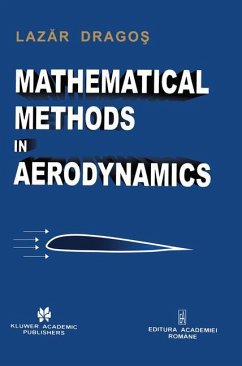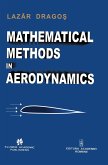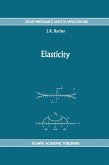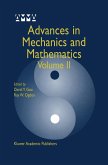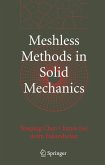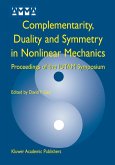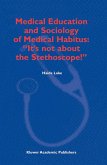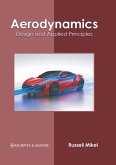Lazãr Dragos
Mathematical Methods in Aerodynamics
Lazãr Dragos
Mathematical Methods in Aerodynamics
- Broschiertes Buch
- Merkliste
- Auf die Merkliste
- Bewerten Bewerten
- Teilen
- Produkt teilen
- Produkterinnerung
- Produkterinnerung
The researchers in Aerodynamics know that there is not a unitary method of investigation in this field. The first mathematical model of the air plane wing, the model meaning the integral equation governing the phe nomenon, was proposed by L. Prandtl in 1918. The integral equation deduced by Prandtl, on the basis of some assumptions which will be specified in the sequeL furnishes the circulation C(y) (see Chapter 6). U sing the circulation, one calculates the lift and moment coefficients, which are very important in Aerodynamics. The first hypothesis made by Prandtl consists in replacing the…mehr
Andere Kunden interessierten sich auch für
![Mathematical Methods in Aerodynamics Mathematical Methods in Aerodynamics]() Lazãr DragosMathematical Methods in Aerodynamics248,99 €
Lazãr DragosMathematical Methods in Aerodynamics248,99 €![Elasticity Elasticity]() J. R. BarberElasticity125,99 €
J. R. BarberElasticity125,99 €![Advances in Mechanics and Mathematics Advances in Mechanics and Mathematics]() David Yang Gao / R.W. Ogden (Hgg.)Advances in Mechanics and Mathematics191,99 €
David Yang Gao / R.W. Ogden (Hgg.)Advances in Mechanics and Mathematics191,99 €![Meshless Methods in Solid Mechanics Meshless Methods in Solid Mechanics]() Youping ChenMeshless Methods in Solid Mechanics62,99 €
Youping ChenMeshless Methods in Solid Mechanics62,99 €![Complementarity, Duality and Symmetry in Nonlinear Mechanics Complementarity, Duality and Symmetry in Nonlinear Mechanics]() David Yang Gao (Hrsg.)Complementarity, Duality and Symmetry in Nonlinear Mechanics247,99 €
David Yang Gao (Hrsg.)Complementarity, Duality and Symmetry in Nonlinear Mechanics247,99 €![Iutam Symposium on Field Analyses for Determination of Material Parameters -- Experimental and Numerical Aspects Iutam Symposium on Field Analyses for Determination of Material Parameters -- Experimental and Numerical Aspects]() P. St†hle / K.G. Sundin (Hgg.)Iutam Symposium on Field Analyses for Determination of Material Parameters -- Experimental and Numerical Aspects192,99 €
P. St†hle / K.G. Sundin (Hgg.)Iutam Symposium on Field Analyses for Determination of Material Parameters -- Experimental and Numerical Aspects192,99 €![Aerodynamics: Design and Applied Principles Aerodynamics: Design and Applied Principles]() Aerodynamics: Design and Applied Principles166,99 €
Aerodynamics: Design and Applied Principles166,99 €-
-
-
The researchers in Aerodynamics know that there is not a unitary method of investigation in this field. The first mathematical model of the air plane wing, the model meaning the integral equation governing the phe nomenon, was proposed by L. Prandtl in 1918. The integral equation deduced by Prandtl, on the basis of some assumptions which will be specified in the sequeL furnishes the circulation C(y) (see Chapter 6). U sing the circulation, one calculates the lift and moment coefficients, which are very important in Aerodynamics. The first hypothesis made by Prandtl consists in replacing the wing by a distribution of vortices on the plan-form D of the wing (i. e. the projection of the wing on the plane determined by the direction of the uniform stream at infinity and t he direction of the span of the wing). Since such a distribution leads to a potential flow in the exterior of D and the experiences show that downstream the flow has not this character, Prandtl introduces as a sup plementary hypothesis another vortices distribution on the trace of the domain D in the uniform stream. The first kind of vortices are called tied vortices and the second kind of vortices are called free vortices.
Produktdetails
- Produktdetails
- Verlag: Editura Academi / Springer / Springer Netherlands
- Artikelnr. des Verlages: 978-90-481-6445-5
- Softcover reprint of the original 1st ed. 2004
- Seitenzahl: 592
- Erscheinungstermin: 1. Dezember 2010
- Englisch
- Abmessung: 235mm x 155mm x 32mm
- Gewicht: 885g
- ISBN-13: 9789048164455
- ISBN-10: 9048164451
- Artikelnr.: 32024936
- Herstellerkennzeichnung Die Herstellerinformationen sind derzeit nicht verfügbar.
- Verlag: Editura Academi / Springer / Springer Netherlands
- Artikelnr. des Verlages: 978-90-481-6445-5
- Softcover reprint of the original 1st ed. 2004
- Seitenzahl: 592
- Erscheinungstermin: 1. Dezember 2010
- Englisch
- Abmessung: 235mm x 155mm x 32mm
- Gewicht: 885g
- ISBN-13: 9789048164455
- ISBN-10: 9048164451
- Artikelnr.: 32024936
- Herstellerkennzeichnung Die Herstellerinformationen sind derzeit nicht verfügbar.
1 The Equations of Ideal Fluids.- 1.1 The Equations of Motion.- 1.2 The Potential Flow.- 1.3 The Shock Waves Theory.- 2 The Equations of Linear Aerodynamics and its Fundamental Solutions.- 2.1 The Equations of Linear Aerodynamics.- 2.2 The Fundamental Solutions of the Equation of the Potential.- 2.3 The Fundamental Solutions of the Steady System.- 2.4 The Fundamental Solutions of the Oscillatory System.- 2.5 Fundamental Solutions of the Unsteady System I.- 3 The Infinite Span Airfoil in Subsonic Flow.- 3.1 The Airfoil in the Unlimited Fluid.- 3.2 The Airfoil in Ground Effects.- 3.3 The Airfoil in Tunnel Effects.- 3.4 Airfoils Parallel to the Undisturbed Stream.- 3.5 Grids of Profiles.- 3.6 Airfoils in Tandem.- 4 The Application of the Boundary Element Method to the Theory of the Infinite Span Airfoil in Subsonic Flow.- 4.1 The Equations of Motion.- 4.2 Indirect Methods for the Unlimited Fluid Case.- 4.3 The Direct Method for the Unlimited Fluid Case.- 4.4 The Airfoil in Ground Effects.- 4.5 The Airfoil in Tunnel Effects.- 4.6 Other Methods. The Intrinsic Integral Equation.- 5 The Theory of Finite Span Airfoil in Subsonic Flow. The Lifting Surface Theory.- 5.1 The Lifting Surface Equation.- 5.2 Methods for the Numerical Integration of the Lifting Surface Equation.- 5.3 Ground Effects in the Lifting Surface Theory.- 5.4 The Wing of Low Aspect Ratio.- 6 The Lifting Line Theory.- 6.1 Prandtl's Theory.- 6.2 The Theory of Integration of Prandtl's Equation. The Reduction to Fredholm-Type Integral Equations.- 6.3 The Symmetrical Wing. Vekua's Equation. A Larger Class of Exact Solutions.- 6.4 Numerical Methods.- 6.5 Various Extensions of the Lifting Line Theory.- 6.6 The Lifting Line Theory in Ground Effects.- 6.7 The Curved Lifting Line.- 7 The Application of the BoundaryIntegral Equations Method to the Theory of the Three-Dimensional Airfoil in Subsonic Flow.- 7.1 The First Indirect Method (Sources Distributions).- 7.2 The Second Indirect Method (Doublet Distributions). The Incompressible Fluid.- 7.3 The Direct Method. The Incompressible Fluid.- 8 The Supersonic Steady Flow.- 8.1 The Thin Airfoil of Infinite Span.- 8.2 Ground and Tunnel Effects.- 8.3 The Three-Dimensional Wing.- 8.4 The Theory of Integration of the H Equation.- 8.5 The Theory of Conical Motions.- 8.6 Flat Wings.- 9 The Steady Transonic Flow.- 9.1 The Equations of the Transonic Flow.- 9.2 The Plane Flow.- 9.3 The Three-Dimensional Flow.- 10 The Unsteady Flow.- 10.1 The Oscillatory Profile in a Subsonic Stream.- 10.2 The Oscillatory Surface in a Subsonic Stream.- 10.3 The Theory of the Oscillatory Profile in a Supersonic Stream.- 10.4 The Theory of the Oscillatory Wing in a Supersonic Stream.- 10.5 The Oscillatory Profile in a Sonic Stream.- 10.6 The Three-Dimensional Sonic Flow.- 11 The Theory of Slender Bodies.- 11.1 The Linear Equations and Their Fundamental Solutions.- 11.2 The Slender Body in a Subsonic Stream.- 11.3 The Thin Body in a Supersonic Stream.- A Fourier Transform and Notions of the Theory of Distributions.- A.1 The Fourier Transform of Functions.- A.3 Distributions.- A.4 The Convolution. Fundamental Solutions.- A.6 The Fourier Transform of the Temperate Distributions.- A.7 The Calculus of Some Inverse Fourier Transforms.- A.8 The Fourier Transform in Bounded Domains.- B Cauchy-type Integrals. Dirichlet's Problem for the Half-Plane. The Calculus of Some Integrals.- B.1 Cauchy-type Integrals.- B.2 The Principal Value in Cauchy's Sense.- B.3 Plemelj's Formulas.- B.4 The Dirichlet's Problem for the Half-Plane.- B.5 The Calculus of Certain Integralsin the Complex Plane.- B.6 Glauert's Integral. Its Generalization and Some Applications.- B.7 Other Integrals.- C Singular Integral Equations.- C.1 The Thin Profile Equation.- C.2 The Generalized Equation of Thin Profiles.- C.3 The Third Equation.- C.4 The Forth Equation.- C.5 The Fifth Equation.- D The Finite Part.- D.1 Introductory Notions.- D.2 The First Integral.- D.3 Integrals with Singularities in an Interval.- D.4 Hadamard-Type Integrals.- D.5 Generalization.- E Singular Multiple Integrals.- F Gauss-Type Quadrature Formulas.- F.1 General Theorems.- F.2 Formulas of Interest in Aerodynamics.- F.3 The Modified Monegato's Formula.- F.4 A Useful Formula.
1 The Equations of Ideal Fluids.- 1.1 The Equations of Motion.- 1.2 The Potential Flow.- 1.3 The Shock Waves Theory.- 2 The Equations of Linear Aerodynamics and its Fundamental Solutions.- 2.1 The Equations of Linear Aerodynamics.- 2.2 The Fundamental Solutions of the Equation of the Potential.- 2.3 The Fundamental Solutions of the Steady System.- 2.4 The Fundamental Solutions of the Oscillatory System.- 2.5 Fundamental Solutions of the Unsteady System I.- 3 The Infinite Span Airfoil in Subsonic Flow.- 3.1 The Airfoil in the Unlimited Fluid.- 3.2 The Airfoil in Ground Effects.- 3.3 The Airfoil in Tunnel Effects.- 3.4 Airfoils Parallel to the Undisturbed Stream.- 3.5 Grids of Profiles.- 3.6 Airfoils in Tandem.- 4 The Application of the Boundary Element Method to the Theory of the Infinite Span Airfoil in Subsonic Flow.- 4.1 The Equations of Motion.- 4.2 Indirect Methods for the Unlimited Fluid Case.- 4.3 The Direct Method for the Unlimited Fluid Case.- 4.4 The Airfoil in Ground Effects.- 4.5 The Airfoil in Tunnel Effects.- 4.6 Other Methods. The Intrinsic Integral Equation.- 5 The Theory of Finite Span Airfoil in Subsonic Flow. The Lifting Surface Theory.- 5.1 The Lifting Surface Equation.- 5.2 Methods for the Numerical Integration of the Lifting Surface Equation.- 5.3 Ground Effects in the Lifting Surface Theory.- 5.4 The Wing of Low Aspect Ratio.- 6 The Lifting Line Theory.- 6.1 Prandtl's Theory.- 6.2 The Theory of Integration of Prandtl's Equation. The Reduction to Fredholm-Type Integral Equations.- 6.3 The Symmetrical Wing. Vekua's Equation. A Larger Class of Exact Solutions.- 6.4 Numerical Methods.- 6.5 Various Extensions of the Lifting Line Theory.- 6.6 The Lifting Line Theory in Ground Effects.- 6.7 The Curved Lifting Line.- 7 The Application of the BoundaryIntegral Equations Method to the Theory of the Three-Dimensional Airfoil in Subsonic Flow.- 7.1 The First Indirect Method (Sources Distributions).- 7.2 The Second Indirect Method (Doublet Distributions). The Incompressible Fluid.- 7.3 The Direct Method. The Incompressible Fluid.- 8 The Supersonic Steady Flow.- 8.1 The Thin Airfoil of Infinite Span.- 8.2 Ground and Tunnel Effects.- 8.3 The Three-Dimensional Wing.- 8.4 The Theory of Integration of the H Equation.- 8.5 The Theory of Conical Motions.- 8.6 Flat Wings.- 9 The Steady Transonic Flow.- 9.1 The Equations of the Transonic Flow.- 9.2 The Plane Flow.- 9.3 The Three-Dimensional Flow.- 10 The Unsteady Flow.- 10.1 The Oscillatory Profile in a Subsonic Stream.- 10.2 The Oscillatory Surface in a Subsonic Stream.- 10.3 The Theory of the Oscillatory Profile in a Supersonic Stream.- 10.4 The Theory of the Oscillatory Wing in a Supersonic Stream.- 10.5 The Oscillatory Profile in a Sonic Stream.- 10.6 The Three-Dimensional Sonic Flow.- 11 The Theory of Slender Bodies.- 11.1 The Linear Equations and Their Fundamental Solutions.- 11.2 The Slender Body in a Subsonic Stream.- 11.3 The Thin Body in a Supersonic Stream.- A Fourier Transform and Notions of the Theory of Distributions.- A.1 The Fourier Transform of Functions.- A.3 Distributions.- A.4 The Convolution. Fundamental Solutions.- A.6 The Fourier Transform of the Temperate Distributions.- A.7 The Calculus of Some Inverse Fourier Transforms.- A.8 The Fourier Transform in Bounded Domains.- B Cauchy-type Integrals. Dirichlet's Problem for the Half-Plane. The Calculus of Some Integrals.- B.1 Cauchy-type Integrals.- B.2 The Principal Value in Cauchy's Sense.- B.3 Plemelj's Formulas.- B.4 The Dirichlet's Problem for the Half-Plane.- B.5 The Calculus of Certain Integralsin the Complex Plane.- B.6 Glauert's Integral. Its Generalization and Some Applications.- B.7 Other Integrals.- C Singular Integral Equations.- C.1 The Thin Profile Equation.- C.2 The Generalized Equation of Thin Profiles.- C.3 The Third Equation.- C.4 The Forth Equation.- C.5 The Fifth Equation.- D The Finite Part.- D.1 Introductory Notions.- D.2 The First Integral.- D.3 Integrals with Singularities in an Interval.- D.4 Hadamard-Type Integrals.- D.5 Generalization.- E Singular Multiple Integrals.- F Gauss-Type Quadrature Formulas.- F.1 General Theorems.- F.2 Formulas of Interest in Aerodynamics.- F.3 The Modified Monegato's Formula.- F.4 A Useful Formula.

